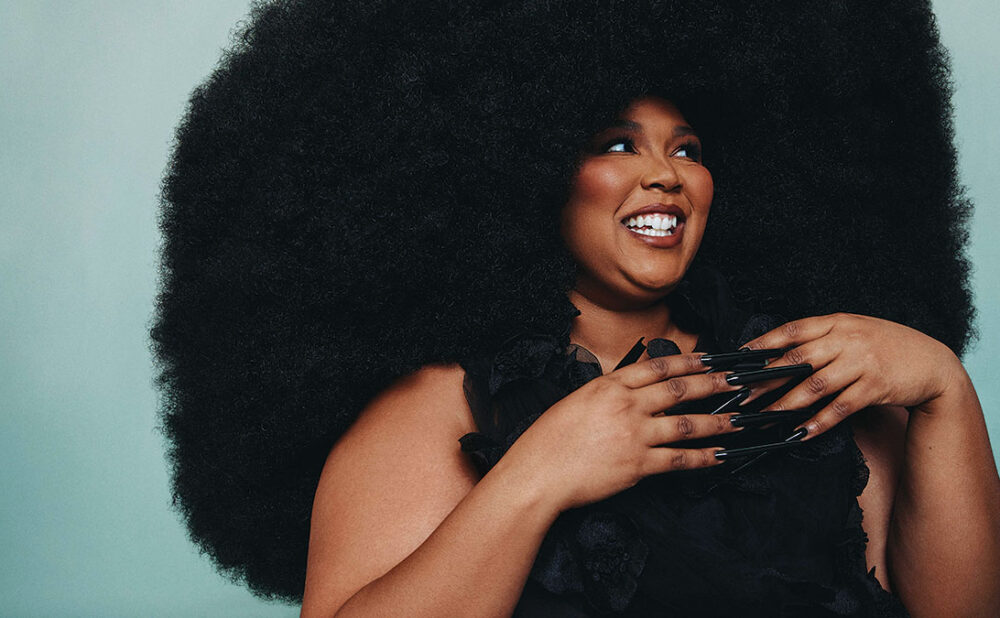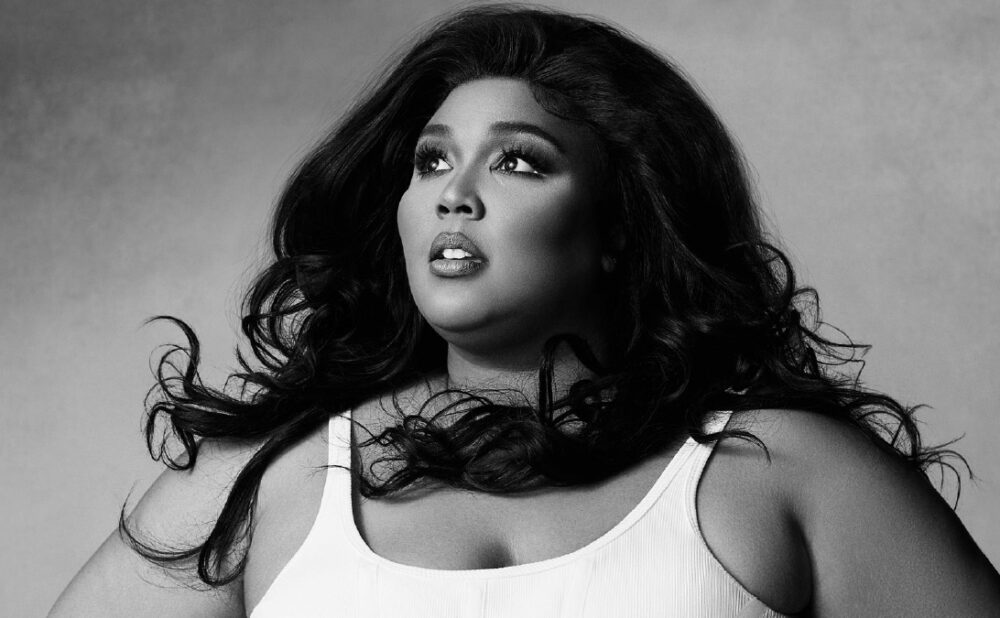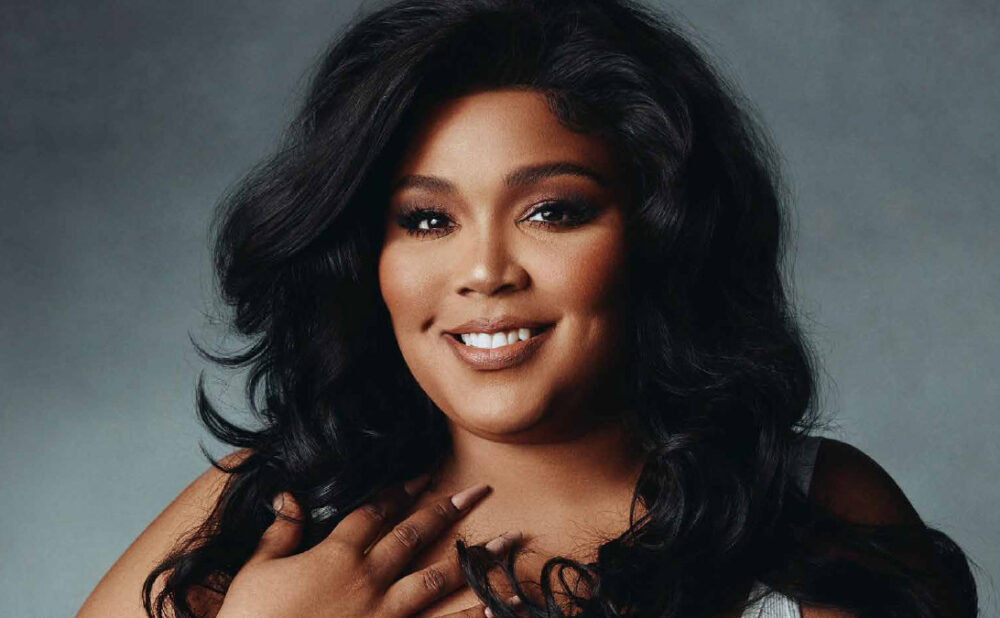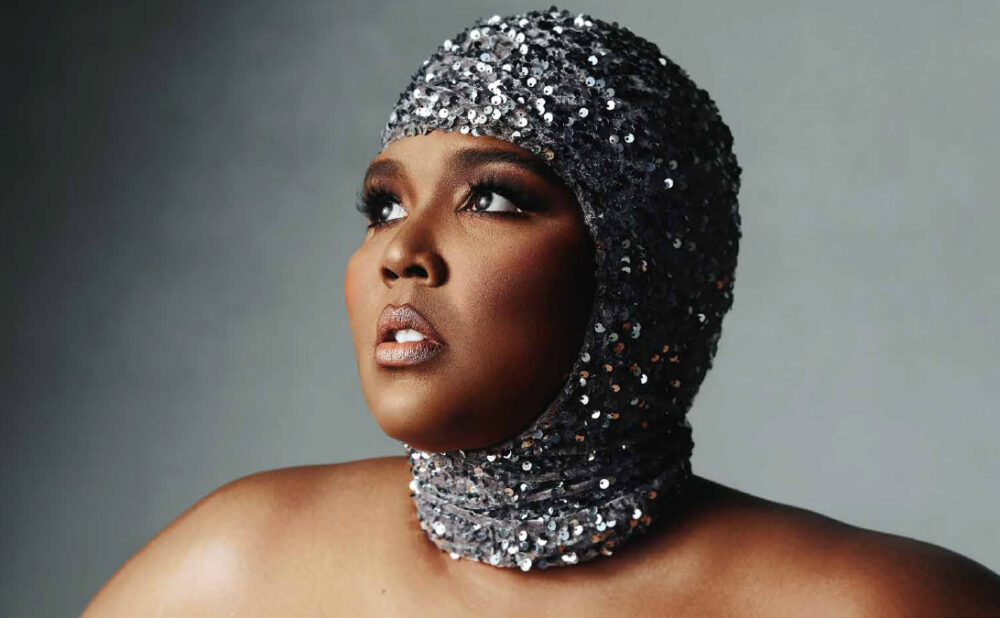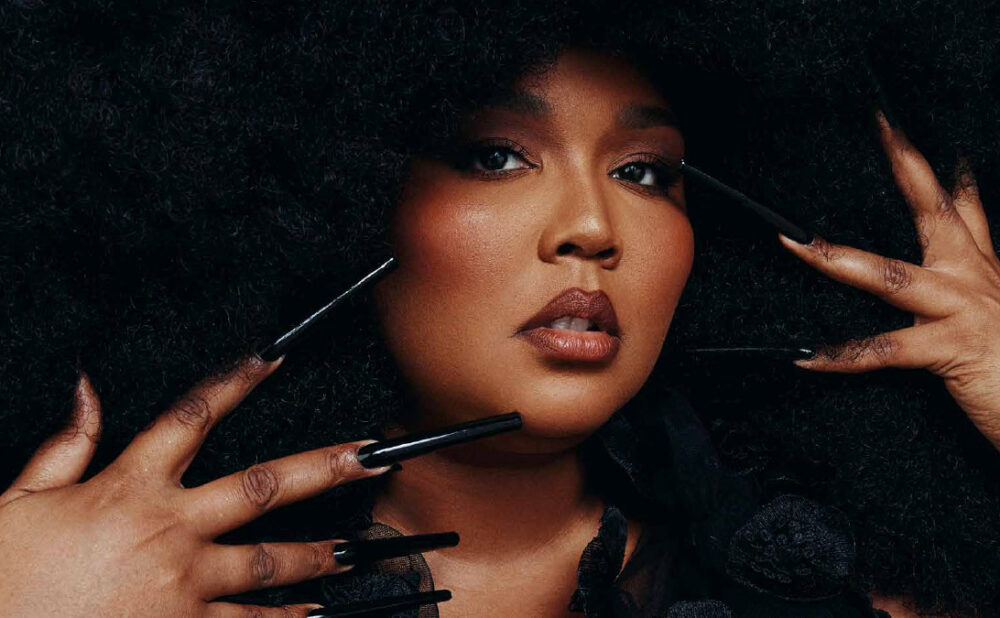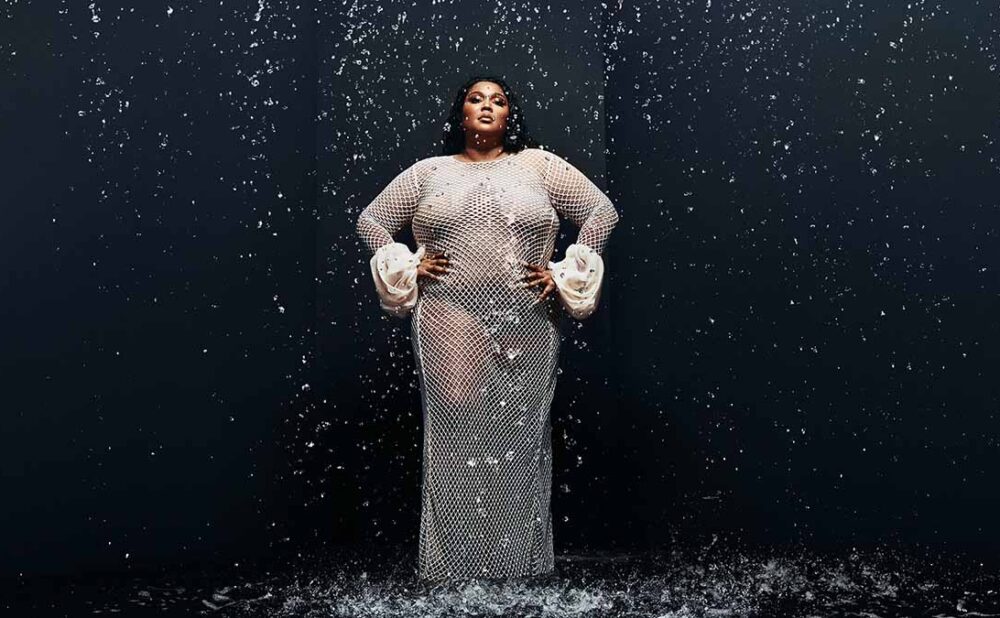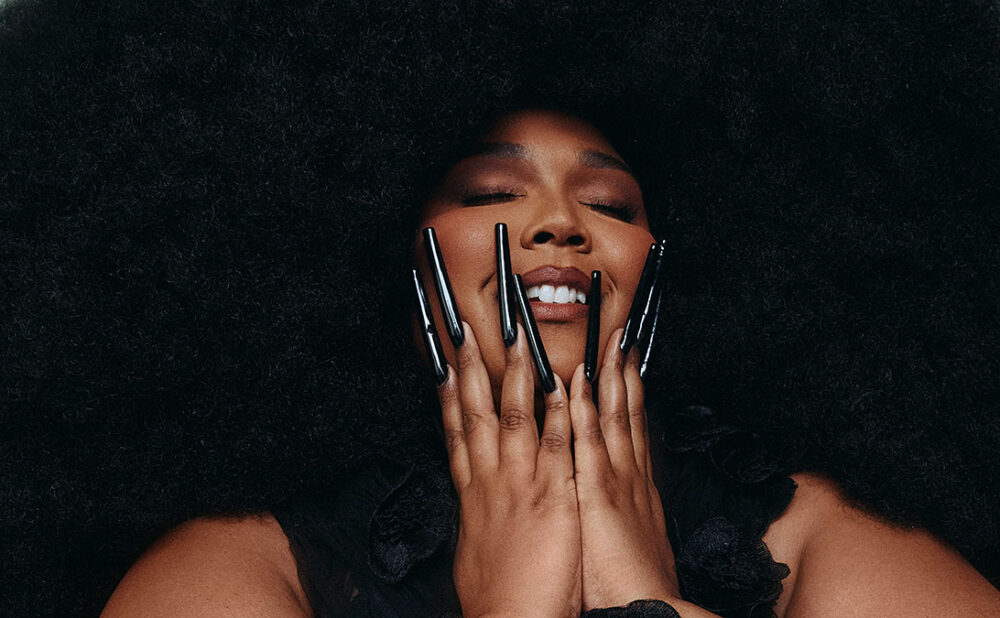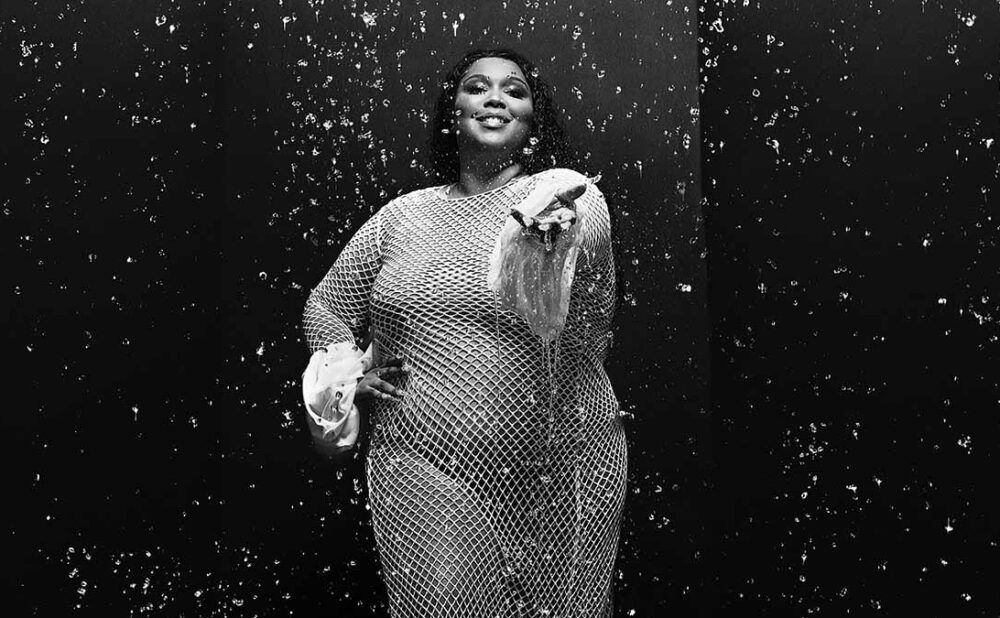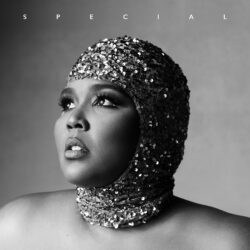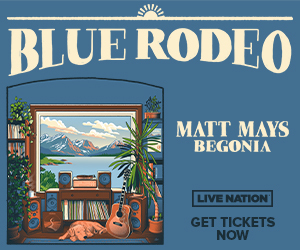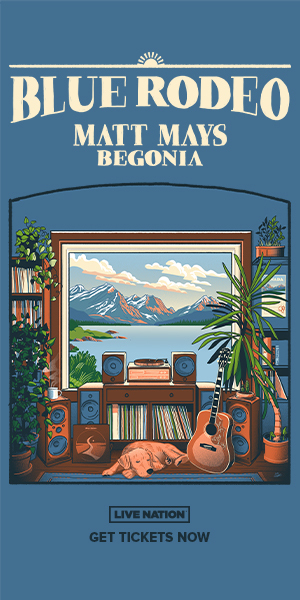Lizzo is learning self-love, practicing hope, and making space to let everyone in
Lizzo loves you, she loves me, hell, she loves everybody. Rayne Fisher-Quann catches up with one of the world’s biggest stars — and comes away smiling.
Lizzo thinks I’m beautiful. It’s one of the first things she says to me, just minutes into our Zoom call. She’s glowing, by the way — cloaked in gold and white, beaming from within like a sun goddess. For a second, I find myself genuinely confused as to why I’ve ever felt bad about myself in any capacity at all. This is Lizzo’s superpower, and I’ve been lucky enough to experience it at point-blank range.
Lizzo thinks you’re beautiful, too. If you’ve listened to her music, you’ve heard it loud and clear. A tireless commitment to positivity and empowerment is the beating heart of Lizzo’s singular musical brand: her tracks are booming, ass-clapping, floor-shaking, powered by her megawatt optimism and a voice so full and deep that it feels like a force of nature.
Her latest mega-hit, About Damn Time, is an irresistibly groovy dance number injected with playful pop-wisdom about selflove and letting loose. Its singsong-y rap bridge has spawned a viral TikTok dance trend — a first in Lizzo’s career, and one she’s been heavily anticipating. “I fantasized about doing interviews like this, where they’re like, ‘Your song is taking over TikTok,’” she says. “Fuck. It’s really happening.” The track is off her latest album, Special, which dropped in July and showcases Lizzo in her most liberated form yet.
Whether it’s through her music or over a video call, positivity radiates off of Lizzo like body heat. As our conversation begins, she asks how I’m doing — an unassuming question, usually posed as part of a song-and-dance of trite, unavoidable corporate niceties. To be honest, I’m actually feeling pretty burnt out, but I shelf the confessional in favour of flashing the socially sanctioned response: a tight smile, an awkward laugh, an assurance that I’m doing well, thank you.
I’ve already taken the breath that will launch into my first question when she veers off script. “Really?” She questions me, an unorthodox level of concern painted across her face. I wonder, briefly, if Lizzo can read my mind. “You can tell me if you’re not okay,” she adds. “It’s okay.”
I tell her the truth: I’ve been working really hard lately, and I’m a bit tired. That’s when she says it. “I just want to tell you: you have a beautiful face. Your cheekbones are beautiful, you have a beautiful smile, beautiful lips. Your eyes are so beautiful.” Later, she makes me promise that I’ll get some rest. It’s detailed and very generous — the kind of compliment that can only come from working so hard to love yourself that it teaches you how to love other people, too.
When I ask how she’s doing, however, she doesn’t hesitate. “I know you see me, child.” She laughs, shoots a wry smile my way and responds by belting out the brassy riff of her most famous song. “Good as hell!”
Lizzo, born Melissa Jefferson, hasn’t always been privy to the wellspring of poptimist enthusiasm that’s come to define her life in the spotlight (“Obviously,” she deadpans).
“I had to get there. That’s why you can hear it in the music. It’s, like, the pursuit of it. But I also write a lot of different kinds of music. Sad songs, songs that are about random shit. I think I wrote a song about leopard-print pants, just to write one. I write tons of songs. The ones that get released, I think, are the ones that I feel like people want to hear from me and that I want to say to the world. I think it always happens to have this silver lining type of thing … like, ‘I’m not the girl I was or used to be, bitch, I’m better.’”
“It’s that kind of thing that I feel is necessary, because I want to make music that’s very useful. There’s people that make music for all different kinds of things. I like to make music that you can use to motivate yourself, because I’m going to be singing that every single day on stage. I’m not trying to sing no curses in my life.”
All musicians perform. It comes with the territory. For the uppermost echelon of pop superstars, though, performance transcends the musical and becomes a way of life: it stops being something you do and starts being something you are. The tricks you pull on stage become almost secondary to the performances you sustain on social media, in interviews, even within the most private moments of your life. Lizzo’s commitment to writing songs about her own journey towards self-acceptance has turned her into a quasi-religious figure for millennial women; a self-help guru who’s expected to have all the answers (and is sometimes crucified when she inevitably doesn’t). She feels an apparent sense of responsibility to fill this role — a desire, as she says, to provide use to the world — but I wonder, too, if her mass adoption as a socio-emotional symbol ever gets in the way of her existence as a person.
Here’s another thing about mega-fame: inevitably, the public starts seeing you as an idea before it sees you as anything else. Some of Lizzo’s consumers view her as an unassailable symbol of body-confidence, self-love and triumph over adversity; a kind of idol with which to blueprint their own salvation. Some see her as a microcosm for a cringey girlboss feminist politic, ingenuine and un-artful. To others — fatphobes, racists, misogynists — she’s a one-woman representation of everything wrong with the world and subject to vile hatred and abuse.
“I think that’s part of the prejudice lens that most human beings are kind of taught to build. Very judgmental. Everyone’s really mean to themselves and to others,” Lizzo says, addressing the criticism flung her way. “I’m iconic for a lot of reasons. And they can be good reasons and bad reasons, but at the end of the day, I’m an icon. So, it’s like, shut the fuck up. You have nothing to say, you know who I am, bitch. Whether you like me or not, my job is done.”
Lizzo’s come-up hasn’t been quick or easy. She’s been open about her experiences sleeping on floors, living out of her car, DIYing her own looks, even working as her own tour manager; her tooth-and-nail climb to musical success has run in parallel to her lifelong struggle for self-acceptance and stability. Often, experiences like these are absorbed, defanged and commodified by the entertainment industry as feel-good inspiration porn — everyone loves a good struggle story and the hustle-culture myth of equal opportunity meritocracy is just as profitable in Hollywood as it is everywhere else. While her perseverance is infinitely admirable, those experiences can also be understood as just another example of a Black woman working three times as hard to get half as much credit and respect. Even at the top of her game (and at the top of her field), Lizzo has found herself still having to fight for privileges that most stars of her calibre don’t even realize they have.
Her recent reality show, Lizzo’s Watch Out for the Big Grrrls, follows her mission to find and train a group of plus-sized dancers to accompany her on tour. They’re systemically underrepresented in the industry, which has often left Lizzo essentially tokenized among her own team.
“Agents don’t represent people with bigger bodies because they haven’t seen commercial value in representing these girls. It doesn’t make them money, because they don’t get booked. I was booking big girls. And those girls were then booking agents, because I was putting them in the Grammys and on award shows and then agents were seeing their value retroactively. And I thought that that was pretty shitty. I was like, I don’t want to be the only person that can help facilitate people who are truly talented … getting the representation they deserve.
“So, launching the show was mostly selfish. I wanted to find dancers, because now that I’m playing arenas, I need 10 to 12 girls on stage. And right now, I got two to seven. If that. So, it was selfish, but also, in a bigger way, I wanted to show the world the value in big-bodied women who can dance, who are talented and beautiful, and have a story to tell.”
Her frustration around size inequality in the industry came to a head in 2019, as she was auditioning dancers for her Coachella set. “They were beautiful girls, and they could dance, but they just didn’t look like me. And I was so upset that this was the status quo of the industry — I wasn’t upset with the girls, obviously, I just couldn’t really articulate what had bothered me. And I left and I went and I got a margarita, sat by myself for a while. And I breathed, and I said, ‘You know what? I gotta do it myself.’”
T hat self-reliant mentality has followed Lizzo’s career since its inception, more of a necessity than an asset in a world where no one wanted to do her any favours. And this isn’t the only place in which Lizzo has had to carve out space where none was offered to her. “I remember one designer said they didn’t have enough fabric to dress me for a tour. And she was in my DMs not even a year later, like ‘Can I make you something?’
Bitch, I thought you didn’t have enough fabric! But that’s neither here nor there. No hard feelings,” she says with a laugh.
“But I went from that, having to literally make all my own stuff with my stylist, to now, where everything I wear is custom. I even saw a TikTok that said ‘Plussized women aren’t having a revolution, high-fashion designers and brands are just making big clothes for Lizzo and not for sale.’ What a crazy contrast from when everything had to be, like, bespoke and custom because no one would dress me. And now that’s still happening, but it’s … part of the same systemic issue.”
When looking towards the future, Special promises even more personal liberation than before. “It’s so good,” she promises. “What’s changed is just that I don’t have to — this is gonna come off a little weird — but I don’t have anyone to impress. I don’t have to prove myself. I think that everybody feels that way with their freshman album, their first studio album. This is your introduction to the world, so who are you? Blasé, blasé, you know … the label told me to keep my hair the same colour for a while. But now it’s like, bitch, I get to be who I am. And y’all know who I am. So, I can say whatever the fuck I want. And I think my confidence in that, in my identity, is what you’re going to hear. The biggest change from ’Cuz I Love You to Special is the confidence.”
Lizzo loves herself. Her music is a testament to a life spent battling to love a body and mind that the world around her, more often than not, tried to actively destroy. Rather than force self-love platitudes like a prescription down an unwilling throat, her music offers a suggestion instead: You can love yourself like this, too.
I think about the kind words Lizzo gave me for a while after I shut my laptop. I’m a skeptic by nature and a pessimist too — there’s always been a part of me that waits for the other shoe to drop. I briefly wonder if she was trying to throw me off guard somehow (and hey — if she was, she certainly accomplished the goal with the efficacy and talent we’ve come to expect from her). It’s only later that it occurs to me that she was, perhaps, just being kind.
In a social landscape that increasingly traffics in irony and detachment as currency, the world of earnest optimism and unabashed confidence is not one I’m familiar with. That’s Lizzo’s world. I should try to visit more often.
You Might Also Like
NXNE announces free outdoor show, 100-plus more bands
Alex Porat plays Queen West daytime gig, Jane’s Party, High Flyer, Tamir, [...]
By NEXT Magazine

